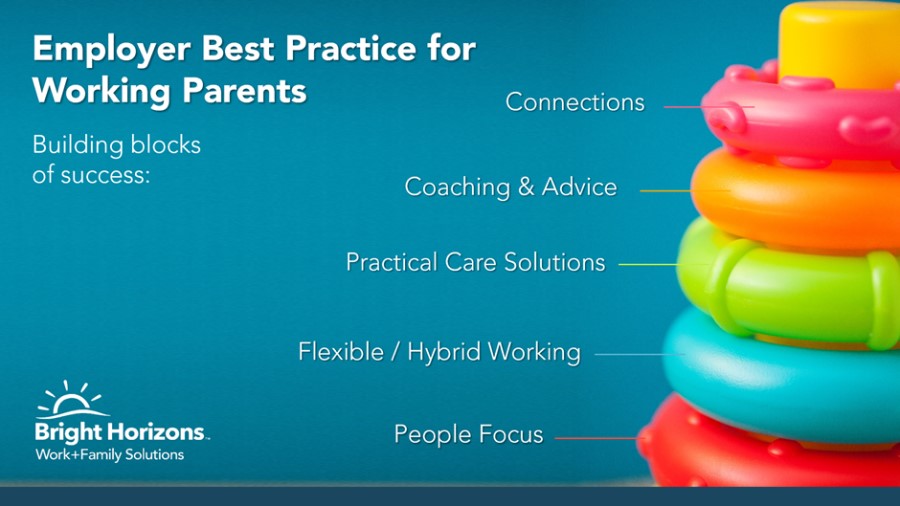Top five ways to support and empower parents in your workforce

Here are our five top ways to support and empower parents in your workforce:
1. People focus
- We’ve ‘seen’ each other in new ways during the pandemic. Being so much on camera at home and having more pressing conversations about racial injustice, have made more of us more direct and honest in more of our workplace conversations.
- We need to equip managers for empathy (e.g. a checklist for a range of conversations that acknowledge the people side can help).
- Trust is vital, resilience may be wearing thin: catch people doing well, recognise their ‘above and beyond’ efforts.
- Benefits may need extension, e.g. opening the benefits window again, considering families in the event of bereavement.
- And specifically, in relation to parents, and the gendered impact of COVID, now’s a good time to promote and encourage gender-inclusive parental leave and flexibility.
2. Flexible and hybrid working
- Be clear on what needs to be delivered and let teams and individuals specify how. It seems that many people will settle on a blend of workplace and home office, if their roles allow.
- The office is not dead – most opinions suggest a blend in the future with two days onsite and three days remote being a likely pattern in roles that allow.
- We have to put in the work to sustain office culture with dispersed teams. Individuals differ in what works: extraverts in particular have been missing their dose of office life and need to find creative ways of replacing the water cooler conversations. One option is to set up a virtual seating plan where people rotate around an online plan and commit to having a virtual coffee with the randomly-generated neighbour who changes once a fortnight. Or, keeping it simple, go round at the start of each online team meeting asking everyone to name one thing they’re proud of, or grateful for.
- Some people’s homes are less suitable for working from, including working around children where space is limited. IBM’s Work From Home Pledge – launched by Arvind Krishna, CEO, came from grassroots IBMers – it includes understanding we can't always be camera-ready, and not assuming people are ‘always on’! You have to respond to people's circumstances and unique home situations as well as encouraging work-life balance.
3. Practical care solutions
We’ve seen that for many employers, the pandemic has seen a huge step up in employer involvement in childcare (ongoing care provision, back-up care, wrap-around care and care advice). With the school system delicately poised around selective isolations and circuit breaks, it is a question of stepping in with care or being ready to review priorities, or both. I’ve covered this topic in more detail in my other article: No more childcare vouchers: new ways to support employees with childcare.
4. Coaching and advice
- Now it’s becoming well understood that there is an ongoing need to offer working parents – and others – the time and tools for this new and ongoing journey.
- Our leadership and transition coaches have been busy equipping their coaches with strategies for more blended and flexible ways of working and supporting teams to work with their managers to figure out more agile ways their role deliverables can be achieved.
- Internal buddy or mentor schemes can deliver huge engagement and return on investment. The best schemes do need a bit of setting up: guidelines, light touch training and an online, moderated, matching process. But not only do they repay in terms of value for the mentee but the mentors themselves usually feel hugely encouraged by the experience.
5. Connections
There’s no doubt that networks normalise and go some way to sustaining a sense of positive culture.
- An easy way to generate connections and a network is through providing virtual topic-based events. We’ve seen a huge demand for webinars with expert advice. Current topic trends range from managing anxiety, to tips for remote working, to helping with homework, as well as the perennial professional development topics for working parents around managing career and personal brand since working parents, especially recent returners, can feel less visible at the best of times.
- Many of our clients have also been encouraging internal networks to have self-facilitated meetings or virtual drop-ins on different specific parenting, or caring, or work-related themes.
- Once you have an online forum, a lot can be done virtually, including competitions, sharing quick healthy recipes or sharing pictures drawn by children, for example. Groups that form this way go on to offer mutual support.
- Make sure they are accessible and inclusive: reach out to LGBT+ parents and men.
With these five building blocks in place, not only will working parents and carers be supported and empowered, but the culture will also be inclusive to all, given four out of five of these blocks apply to all, regardless of care arrangements.
The author of this article is Jennifer Liston-Smith, head of thought leadership, Bright Horizons Work+Family Solutions.
Jennifer delivered a speaker session as part of REBA's virtual Employee Wellbeing Congress. Her session Best Practice for Working Parents: engage and support your expert work-life jugglers, back to school, back to work and into the future shared further insights from working with leading employers to solve the challenges for employees who combine work and family. Bright Horizons provides a wide range of work and family solutions to more than 1,200 leading employers globally.
Supplied by REBA Associate Member, Bright Horizons Work+Family Solutions
Bright Horizons is dedicated to providing the best in class work+family solutions.







